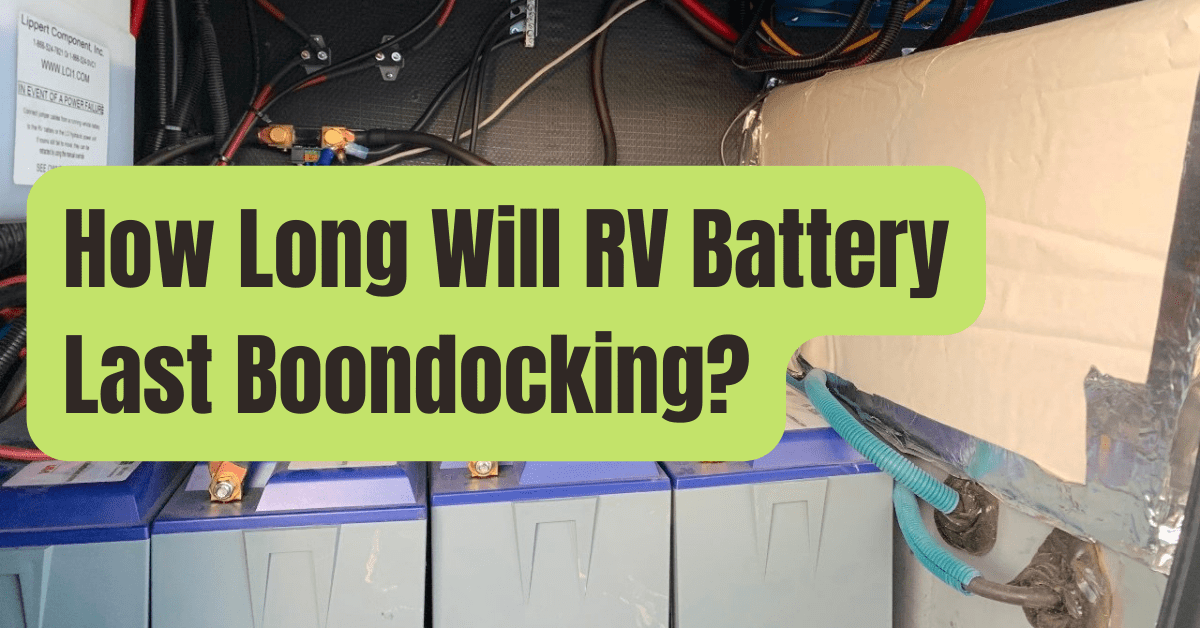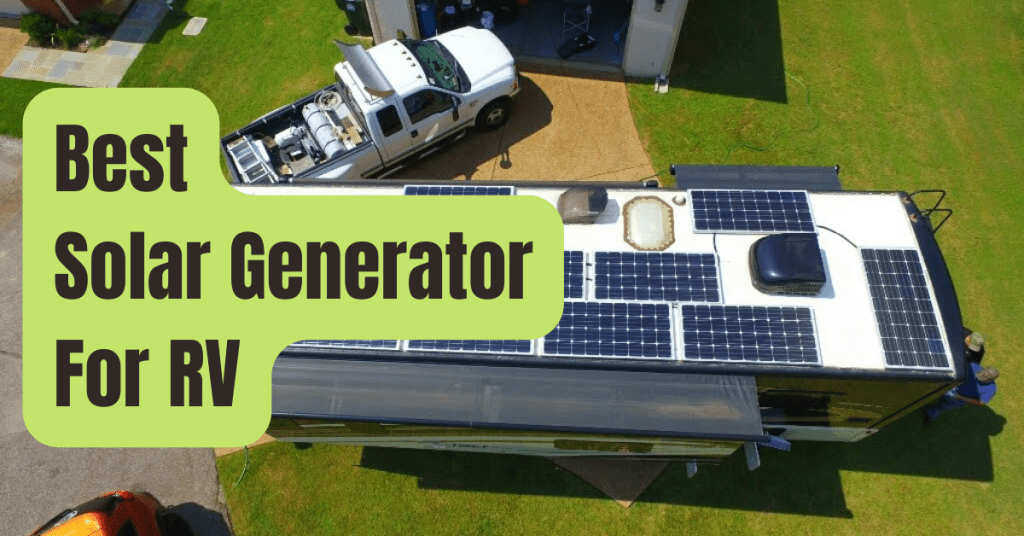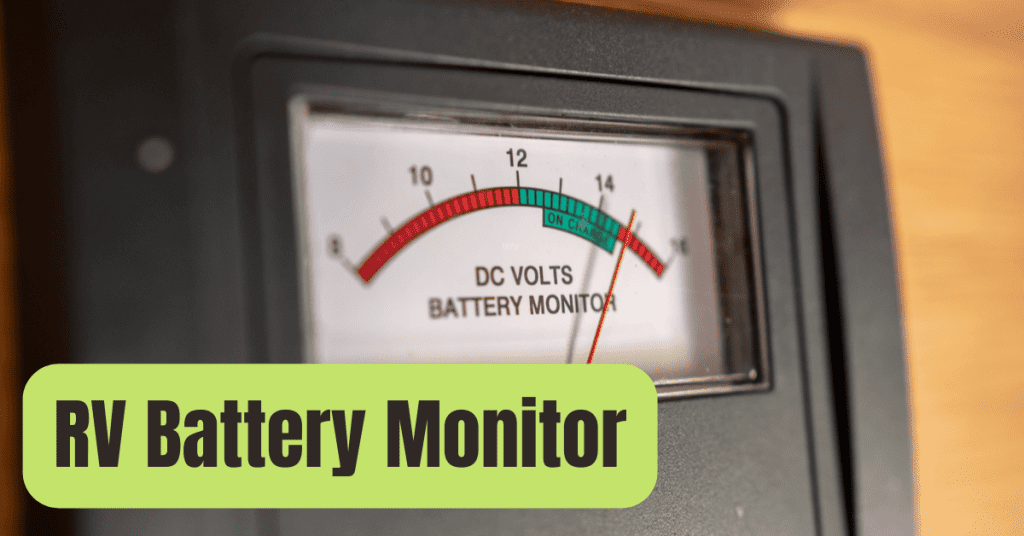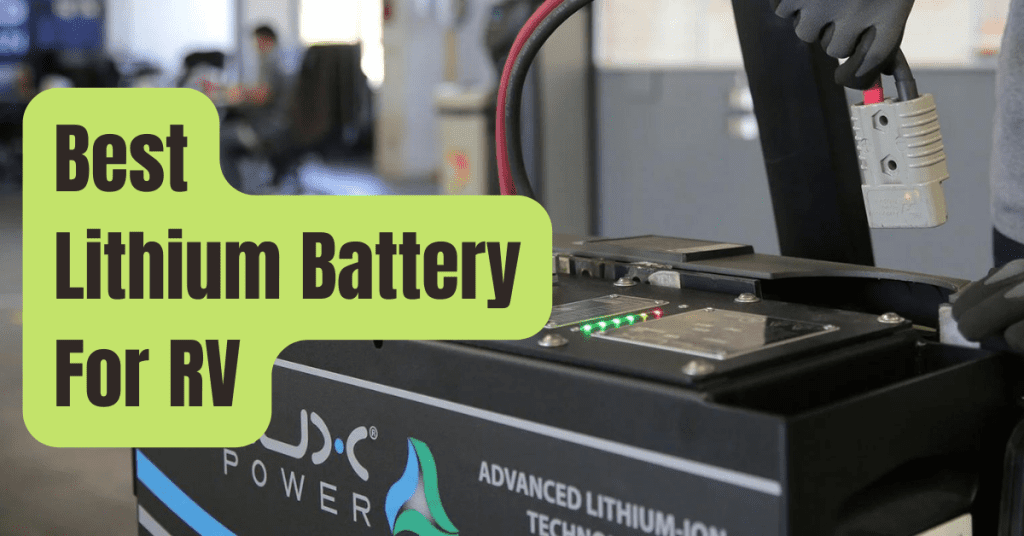Your energy use and the amp hours of your battery determine how long your RV battery will survive when boondocking (or bank of batteries).
Standard electrical appliances like lights, fans, and the water pump may often be operated for a day on a single 100ah 12-volt battery.
You may increase the lifespan of your RV batteries by using less energy, improving your battery system, and switching to other energy sources (propane, generator, etc.) when necessary.
That is, of course, a pretty generic response.
So let’s examine more closely to see how long your battery will last when boondocking, energy-saving advice, and how to recharge your battery when necessary.
Boondocking Or Dry Camping: How Long Will A Battery Last?
It’s crucial to have an accurate idea of how long your RV battery system will last whether you’re boondocking, dry camping, scattered camping, or engaging in any other kind of camping without utilities.
As indicated earlier, a 100 amp-hour (ah) RV battery (the usual RV battery size) should be enough to power your RV for 24 hours on a single charge if you’re boondocking for a day and just utilizing basic electrical devices and appliances.
However, each person uses energy in a different way.
And with a little arithmetic, you can estimate your energy use more accurately before leaving on your camping vacation.
Make a list of the gadgets you’ll use every day and estimate how much time you’ll spend using each one.
Determine how many amps each gadget uses.
This is sometimes written in the owner’s manual or on the actual gadget.
If they just show the watts for a certain device, divide the watts/volts value to get the amps equivalent.
Important: You must double the amps by 10 if your appliance or gadget runs on 120 volts.
Let’s examine a brief illustration:
An average 12 volt light bulb uses 1.5 amps. The light will utilize 3 amp hours of battery power after two hours of usage.
Simple, yes?
Let’s look at another example with a 120-volt appliance:
On 120 volts AC, a coffee maker consumes 450W. 450 divided by 120 equals 3.75 amps. In other words, the coffee maker consumes 3.75 ah while running on 120v AC electricity. We now just need to increase the amps by 10 to convert them to 12-volts. So, 3.75*10=37.5 ah. Your coffee maker will use around 37.5 ah every day if you use it for an hour.
To estimate the total amp hours you will use each day, sum up all the amp hours of the gadgets and appliances you intend to use.
You may use this information to determine how long your deep-cycle battery (or battery bank) can go without being charged.
Just bear in mind that you can only drain lead-acid batteries in your RV or travel trailer to a maximum of roughly 50% before you need to recharge them (otherwise, you will cut its life short).
In other words, you will only get around 50 amp-hours from a 100 ah battery.
On the other hand, lithium-ion batteries may fully deplete before being recharged (though the BMS will typically stop the discharge at 80-90 percent ).
Boondocking Battery Life Extension Tips
It might be crucial to preserve energy and extend the life of your RV batteries if you often boondock or dry camp.
Here are some suggestions for conserving electricity when boondocking to increase battery life.
#1. Make Wise Use of Lights
Energy is heavily used by lights, especially those that use incandescent bulbs.
By just utilizing lights when necessary, you may save vital battery energy.
You may try the following advice:
- Try reading throughout the day rather than at night if you like reading.
- Set up your day to take advantage of the sun. Avoid staying up late while it’s dark out and wake up with the sun.
- When you need illumination, use LED lanterns and flashlights. Flashlights utilize rechargeable batteries, which may last for weeks without recharging. Reading, playing games, and other nighttime activities may be done using lanterns. An good way to light up the exterior of your RV at night is with inexpensive solar-powered LED yard lights.
#2. Replace Incandescent Bulbs With LEDs
Speaking of lighting, replacing outdated incandescent bulbs with LED (or fluorescent) bulbs will consume less power from your home batteries and is an easy method to save electricity in an RV. In addition to using less power, they also provide light that is brighter than incandescent lighting.
#3. Sparingly Use The Furnace
Although the heater in your RV most likely burns propane, the fan may use a lot of electricity. Therefore, it’s crucial to only occasionally use your gas furnace.
Here are some pointers:
- Place your RV in a spot where the sun can warm it. When the temperature is mild throughout the day, this works nicely (Spring and Fall).
- To remain warm at night, pack extra blankets and sleeping bags.
- Your RV may be heated efficiently without power by using a portable gas heater, such as the Mr. Heater Buddy. Naturally, you’ll still need propane gas, but a simple 1-pound propane tank ought to be plenty to heat your camper for a few days in fair weather. Use only heaters intended for indoor use, please.
- Reduce the temperature a few degrees when you do need to use the furnace.
- Increase the insulation in your RV’s floor, windows, and skirting to help it retain heat throughout the winter.
#4. Instead Of A Laptop, Use A Tablet Or Phone.
When charging, laptops may use up to 100 watts of electricity.
In contrast, a tablet only requires 10 watts.
If at all feasible, bring your tablet instead of your laptop.
Or even better, disconnect everything and leave both at home if you can!
#5. Use Of Water Pumps Should Be Minimized
A water pump uses roughly 5 amps while running and continues to require a little amount of electricity even when not in use, however each type differs.
When not in use, try to use your water pump sparingly and switch it off.
#6. Use Lithium Batteries Instead
By completely discharging a lithium-ion battery as opposed to a lead-acid battery, you can receive approximately twice as much useable power.
For best lifetime, a lead-acid battery should only be drained to roughly 50%.
When Boondocking, How To Charge An RV Battery
No matter how effectively you manage your battery energy, if you boondock for a long enough period of time, you’ll need to recharge your batteries.
So, how do you recharge your RV batteries when boondocking?
You have two primary choices:
- Solar Panels: A quick and very effective method for recharging RV batteries. Simply put, this technique discreetly charges your batteries by using solar energy. Additionally, it respects the environment. And starting to use solar energy is simpler than you would imagine. For a step-by-step breakdown of the procedure, go to our tutorial on how to connect solar panels to RV batteries.
- RV Generator: Another practical choice for swiftly recharging your RV batteries when boondocking is a generator, whether it be portable or built into your car. Check out our guide to the best RV generators for reviews and comparisons of the finest models now available if you don’t have one (or need to improve your existing one). For some crucial details and advice, go to our tutorial on how to charge an RV battery using a generator.
We should also point out that, depending on your setup, you may even be able to use your car’s alternator to charge your RV’s batteries.
A DC to DC power battery charger helps accelerate this generally very sluggish operation.
Finally, if you want to plug in, recharge your batteries, empty your tanks, and replenish your water supply between boondocking excursions, you can always go to a campground or RV park with shore power.










